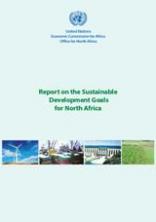Report on the Sustainable Development Goals for North Africa

While the international community is assessing the implementation of the MDGs, measuring progress towards the achievement of the sustainable development and the gap to be bridged, in particular by taking into account emerging challenges, North Africa is not only asked to contribute, but also impulse, this international dynamics by participating actively to the elaboration of the new vision of the world, in the continuity of the dynamics launched by Rio+20, and in particular within the framework of the Post-2015 Agenda.
The Rio+20 outcome document entitled "The Future We Want" highlighted a number of priorities that will guide reflection towards a better world. These priorities include: (i) inclusive economic development; (ii) environment protection and sustainability of natural resources; and (iii) peace and security. Two processes to put this approach into action were launched by the United Nations: the elaboration of the Sustainable Development Goals, and conducting national and regional consultation on the elaboration of post-2015 Agenda. Although implemented in parallel, these two processes are complementary and contribute to the achievement of sustainable development by 2035.
This study falls within the context of the elaboration of the Sustainable Development Goals (SDGs), initiated by the Economic Commission for Africa, and conducted through a regional consultative process involving the five sub-regions of Africa. This process aims at allowing African countries contribute to the identification of the SDGs by incorporating thereto their development priorities for the period 2015-2035.
The approach adopted consisted first of assessing the implementation of sustainable development policies in the seven countries of the sub-region of North Africa in order to draw up the development priorities for the future. National consultations currently conducted, in the context of indentifying the post-2015 Agenda, in 5 countries of the sub-region (Mauritania, Morocco, Sudan, Algeria and Egypt) were reviewed and analyzed. Results were used to refine the definition of these priorities elaborated as main goals taking into account on the one hand, recommendations of Rio+20 outcome document and included in the terms of references of the study, and on the other hand the issue of regional integration as a determinant to achieve sustainable development. Goals were then broken down into targets and indicators.
The report highlights, for the sub-region, the importance of some topics that were not taken into account by the MDGs, while being in fact determinant to the achievement of sustainable development; it is in particular: governance, fight against corruption, climate change, green economy, employment, regional disparities, etc.
It leads to the identification of 4 main goals, 36 targets and 54 indicators, that will be combined with the identified priorities and matrix presentations, in a concerted manner, at the scale of other region. Five sub-regional reports, that reflect the contribution of the region of Africa to the global report on SDGs were presented at the regional consultative workshop for Africa on SDGs, held from October 31st to November 5th 2013 in Addis-Ababa.
Furthermore, the report points out a number of risks which are likely to alter the implementation of the goals, and thus draws up recommendations to avoid failure of this process: (i) strengthening national data production and analysis systems; (ii) building capacities for a better ownership of the SDGs and of the systemic approach underlying them; (iii) organizing training and information campaigns on green economy (approach, principles, tools and benefits of sustainable development; (iv) mobilization of financial resources, including internal ones; (v) coordination between actors.